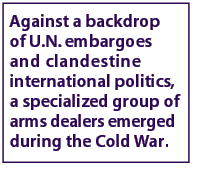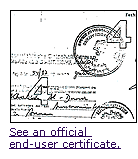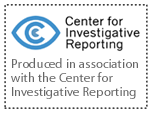|

 Since
the end of the Second World War, tens of millions of people
have been killed by conventional weapons, mostly small arms
such as rifles, machine guns and rocket-propelled grenade launchers.
Sales of advanced weaponry -- fighter jets and high-tech electronics,
sophisticated long-range artillery and warships, and "weapons
of mass destruction" -- tend to receive the most press coverage.
But these costly, sophisticated weapons have not proved as deadly
as ordinary guns and grenades that are easy to buy, easy to
ship and easy to use. Since
the end of the Second World War, tens of millions of people
have been killed by conventional weapons, mostly small arms
such as rifles, machine guns and rocket-propelled grenade launchers.
Sales of advanced weaponry -- fighter jets and high-tech electronics,
sophisticated long-range artillery and warships, and "weapons
of mass destruction" -- tend to receive the most press coverage.
But these costly, sophisticated weapons have not proved as deadly
as ordinary guns and grenades that are easy to buy, easy to
ship and easy to use.
Low-tech, handheld weapons and explosives do the vast majority
of the killing today. There are more than 550 million small
arms currently in circulation, many of them fueling bloody civil
strife in countries from Sri Lanka to Sierra Leone.
In most cases, the countries involved in these conflicts have
been the subject of international embargoes imposed by the United
Nations and other organizations. In some cases, major powers
want to supply the side they favor in the conflict but do not
want their "fingerprints" to be discovered on weapons of war.
Against this backdrop of embargoes and clandestine international
politics, a specialized group of arms dealers emerged during
the Cold War. Their role was to ensure that responsibility for
the death and destruction could not be traced directly to the
supplier. Usually they did their business in places amenable
to the trade. These included countries, like Switzerland, where
arms trafficking was traditionally considered "just another
business." In countries like the United States, where arms trafficking
is strictly controlled, these dealers had to maintain the approval
of the government. The latter situation is detailed in an exclusive
interview with Sarkis Soghanalian regarding his early years
as an arms trafficker operating out of Miami International Airport
in the United States.
 The
arms business gets murky when deals on the table are not sanctioned
publicly by governments. Like any clandestine business, it means
the first thing a dealer must do is establish the ability both
to supply the goods and produce the money. But the dealer also
has to provide the proper paperwork, especially the critical
"end-user certificate." Only
then can the buying and selling of lethal machines, along with
the ammunition and spare parts they devour, become a real deal.
Endless negotiations, fraud and violent crime are also characteristic
of this and most other businesses that border on or are criminal. The
arms business gets murky when deals on the table are not sanctioned
publicly by governments. Like any clandestine business, it means
the first thing a dealer must do is establish the ability both
to supply the goods and produce the money. But the dealer also
has to provide the proper paperwork, especially the critical
"end-user certificate." Only
then can the buying and selling of lethal machines, along with
the ammunition and spare parts they devour, become a real deal.
Endless negotiations, fraud and violent crime are also characteristic
of this and most other businesses that border on or are criminal.
The richest and longest-lived practitioners of this treacherous
business simply "fronted" for a particular government or alliance
or even "ruling family." In the 1950s and 60s, the late legendary
Sam Cummings, a CIA veteran, supplied anyone who had U.S. government
approval with weapons from stockpiles in the United States and
the United Kingdom. And, of course, there were the "middlemen"
who stood in for the oil rich, such as Adnan Kashoggi, who in
the 1970s and 80s often fronted for the interests of the Saudi
royal family. Both men would become so notorious, but invulnerable,
they talked openly on television and in the press.
But it is not only individuals who operate in the international
arms market. In some instances, countries that were subject
to embargoes also got into the clandestine weapons business.
Israel, apartheid-era South Africa and Taiwan are examples of
countries compelled to develop their own arms industries and
commerce as a result of international trade bans against them.
During the first 25 years of its existence, Israel was often
denied weapons and ammunition by U.S. and European governments,
as well as most nations in Asia and, of course, the Middle East.
As a result, it built its own arsenal and related industries
that are to this day active internationally. Israeli arms and
trainers have turned up in China, Guatemala, Ecuador and Central
Africa. Israel Defense Industries has a long history of both
procurement and development of military technology and its sale
overseas. The man once known as the richest Israeli, the late
Shaul Eisenberg, is an example of the "legitimate" arms entrepreneur
using the trade in weapons and weapons technology to create
a multi-faceted business empire.
However, it is the role of the clandestine middleman that distinguishes
the careers of the people profiled on this Web site. They are
specialists. They know the laws and the rules of the game --
from the necessity of obtaining an end-user certificate to making
sure that the weapons work and that the money is there. Often,
they are the key players who provide the deniability that the
government supplying the weapons seeks. They allow government
spokespersons, such as the Ukrainian official interviewed by
FRONTLINE/World, to say, when asked about a delivery
of weapons, "We got certificates. ... What should we do else?"
Media exposure and prosecution can sometimes, it appears, "reform"
these arms merchants. Monzer Al Kassar,
for example, was once the target of Spanish prosecutors and
the press. A high-profile but ultimately unsuccessful criminal
case against him, combined with newspaper and television reports
linking him to virtually every war or terrorist attack in the
1980s and 90s, he says, "made [me] give up the business."

Lowell Bergman is an award-winning
investigative reporter and correspondent/producer for FRONTLINE
and The New York Times, and for 14 years was a producer
for CBS's "60 Minutes."
Reporting for this Web feature was in large part the work of
current and past students of the Graduate
School of Journalism at UC Berkeley and the "Breaking News"
Seminar that Bergman conducts as adjunct professor.
This Web feature was reported and produced jointly with The Center
for Investigative Reporting.

|
|

Leonid
Minin represents a new post-Cold War generation of arms traffickers
-- highly sophisticated East European criminals with complex
global enterprises. For the so-called "Russian Mafia" -- organized
criminals from the 15 nations and many more ethnic groups that
once made up the U.S.S.R. -- ample Red Army stockpiles of small
arms are simply another natural resource to steal, sell and
export. A known leader of the "Odessa Mafia," an organized criminal
group based in Odessa, Ukraine, Minin organizes his business
operations, both criminal and legitimate, on a large and international
scale.
Minin is thought to have entered the illegal arms trade largely
to gain favor with President Charles Taylor of Liberia, where
he had other business interests. Minin became famous when he
was caught by Italian police with 1,500 documents detailing
his worldwide business activities, including arms. The case
against Minin is the first of its kind and could set a precedent.
It features an Italian court prosecuting Minin, an Israeli citizen,
for selling Ukrainian arms to Liberia and Sierra Leone, through
a broker in Russia and banks in Turkish Cyprus, Switzerland
and the United States. It could give U.N. arms embargoes more
prosecutorial bite around the world. READ
MORE
|





